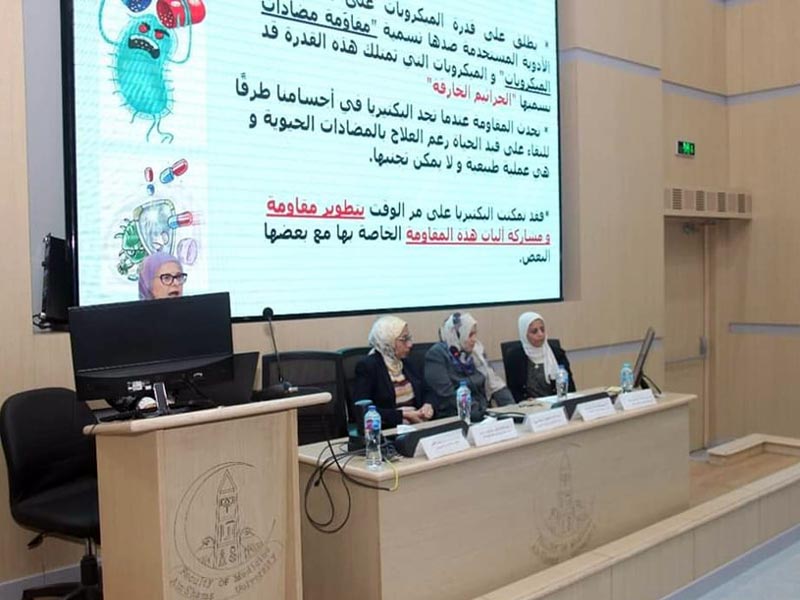Together, prevention of antimicrobial resistance…Awareness symposium at the Faculty of Medicine
An awareness symposium under the slogan "Preventing Antimicrobial Resistance Together" concluded the activities of the celebration organized by the Department of Medical Microbiology and Immunology at the Faculty of Medicine, Ain Shams University, to celebrate the World Week of Antimicrobial Resistance, sponsored by Prof. Dr. Mahmoud El-Meteini, President of Ain Shams University, Prof. Dr. Ghada Farouk, Vice President for Community Service and Environmental Development, Prof. Dr. Ali Al-Anwar, Dean of the Faculty of Medicine and Chairman of the Board of Directors of Hospitals at Ain Shams University, with the supervision and attendance of prof. Dr. Hala Sweed, Vice Dean for Community Service and Environmental Development, and Prof. Dr. Maha Hamdy, Head of the Department of Medical Microbiology and Immunology.
Prof. Dr. Hala Sweed, Vice Dean for Community Service and Environmental Development, opened the seminar and emphasized that the Faculty of Medicine is keen to hold awareness seminars based on its societal role, pointing out that the World Antimicrobial Awareness Week (WAAW) is a global campaign that is celebrated annually, to improve awareness and understanding of antimicrobial resistance and to encourage best practices among the people, stakeholders, and policymakers, which all play a critical role in limiting the emergence and further spread of AMRs.
Also, Prof. Dr. Maha Hamdy, Head of the Department of Medical Microbiology and Immunology, initiated her speech to raise awareness of the dangers of misuse of antibiotics in conjunction with the Public Health Conference in Africa, as this resistance occurs when bacteria, viruses, fungi, and parasites change over time and do not respond to drugs, which makes it difficult to treat infections and increases the risk of disease spread serious illnesses and death. As a result, the effectiveness of the drugs fades and the infection continues in the body, which increases the risk of spreading it to others and increases the rates of complications, deaths, treatment expenses, and the length of stay in hospitals, which negatively affects the individual, the family, society and the health system in Egypt.
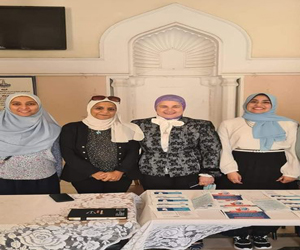 |
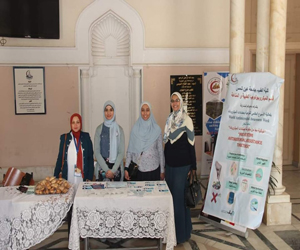 |
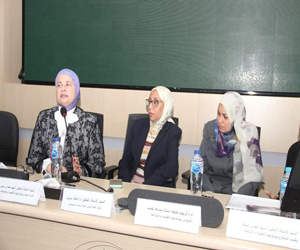 |
||
She added that antimicrobial resistance is a growing global public health problem that reduces the chances of successful treatment for many deadly (life-threatening) infectious diseases, and then treating patients becomes difficult, expensive, and may even be impossible.
She pointed to the size of the risks of antimicrobial resistance globally, according to the World Health Organization, antimicrobial resistance is one of the greatest global threats to public health facing humanity, and 70% of bacteria that cause infection in hospitals are resistant to at least one type of antibiotic and that it is an “invisible epidemic.” It may be "more deadly in the long run than the Coronavirus"
Prof. Dr. Maha Hamdy, Head of the Department of Medical Microbiology, indicated the global threat as the World Health Organization warned in 2016 that the silent pandemic of antimicrobial resistance is a growing public health concern, with about 4.95 million deaths annually associated with resistant bacterial infections alone.
The symposium also touched on a question, which is what accelerates the emergence and spread of antimicrobial resistance? And Prof. Dr. Maha Hamdy, Head of the Department of Medical Microbiology and Immunology, answered that antimicrobial resistance occurs naturally over time, usually through genetic changes, but the resistance is accelerating due to its excessive use among humans and its routine use in food in the use of antibiotics and poor fish, animals and poultry under the pretext of prevention disease or promote growth and the consequent presence of antimicrobial-resistant microbes in human bodies, animals, food, plants and the environment (in water, soil, and air), and can be transmitted from one person to another or between people and herds of animals, including animal foods Source.
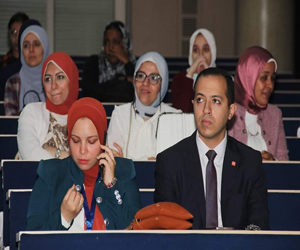 |
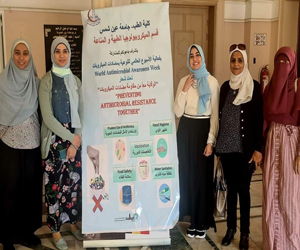 |
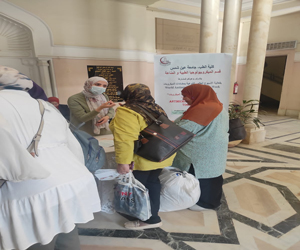 |
||
Her Excellency concluded her speech with what the World Health Organization calls for, that the future of antibiotics depends on all of us, and advice must be sought.
Prof. Dr. Suha Al-Hadi, Professor of the Department of Medical Microbiology and Immunology at the Faculty of Medicine, reviewed some cases from reality and important advice to avoid risks, the most important of which is “the antibiotic should not be kept in the refrigerator after opening it and completing its use, so that it can be used again when needed because it has lost its effectiveness” and that it should not be treated with antibiotics Antibiotics because it often causes the development of antibiotic-resistant bacteria.
Prof. Asst. Dr. Reham Khalifa spoke on stubborn germs and the ever-increasing global threat of antibiotics losing their effectiveness globally, which results in the more difficult treatment of infections, and our ability to treat infections is still threatened by the spread of drug-resistant germs that always innovate new resistance mechanisms.
She referred to the cooperation between the World Health Organization, the Food and Agriculture Organization, and the World Organization for Animal Health on following the principle of "one health" to promote the adoption of practices aimed at reducing antimicrobial resistance and slowing its development, with the aim of spreading awareness and organizing efforts to confront the threat of antimicrobial resistance.
She recommended increasing awareness of antimicrobial resistance, improving surveillance and research, reducing infection rates, and optimizing the use of antimicrobial drugs.
She also added the importance of taking steps at all levels of society to limit the impact of such resistance and reduce its spread.
And she advised dealing with antibiotics carefully, as you only use the antibiotics prescribed by a certified health professional, and always make sure to take the full medical prescription even if you feel better, never use the remaining antibiotics and other instructions, and also touched on the role of doctors, pharmacists as well as individuals, organizations, policymakers, and decision-makers.
Researcher Enas Muhsin Muhammad, director of the scientific research sector at Go Green Company, indicated that natural solutions to strengthen immunity should be researched and considered as the first stage of treatment and used as antimicrobials based on documented scientific research, and that there are studies based on the antibacterial effect of jojoba oil as an example and that It is able (based on published research) to kill certain types of bacteria, so it is one of the steps that can be taken as a natural antibacterial solution in some areas.
It is noteworthy that the activities of the week organized by the Department of Medical Microbiology and Immunology at the Faculty of Medicine, Ain Shams University, to celebrate the World Week of Antimicrobial Resistance, began on Sunday, November 20, and continued throughout the week in the Faculty yard daily from 10 am to 12 non, where leaflets were distributed containing Information about the optimal use of antibiotics and the problems resulting from their misuse in a simplified scientific way.


.svg)

